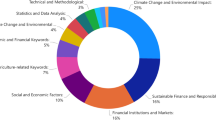Abstract
This paper discusses ways in which the next climate agreement – a renegotiated Kyoto Protocol or a second-period agreement – can be made more cost-effective. The discussion focuses on the design of international emissions trading to facilitate early participation by developing countries. Four aspects are highlighted: the design of compensation rules, the need to regulate the use of the CDM, the effect of allowing borrowing and the implications of a Commitment Period Reserve.
Similar content being viewed by others
References
Bohm, P. (1994), 'On the Feasibility of Joint Implementation of Carbon Emissions Reductions', in A. Amano, ed., Climate Change: Policy Instruments and their Implications. Proceedings of the Tsukuba Workshop of IPCC Working Group III, Center for Global Environmental Research, Environment Agency of Japan, Tsukuba, Japan.
Bohm, P. (2000), 'International Greenhouse Gas Emission Trading – with Special Reference to the Kyoto Protocol', in C. Carraro, ed., Efficiency and Equity of Climate Change Policy. Dordrecht: Kluwer.
Bohm, P. and B. Carlén (2002), 'Cost-effective Approaches to Attracting Low-income Countries to International Emissions Trading: Theory and Experiments', Environmental and Resource Economics 23(2) (October).
Haites, E. and F. Missfeldt (2001), Analysis of the Commitment Period Reserve at National and Global Levels, working paper.
Hargrave, T., S. Kerr, N. Helme and T. Denne (2000), 'Treaty Compliance as Background for an Effective Trading Program', in S. Kerr, ed., Global Emissions Trading: Key Issues for Industrialized Countries (pp. 43–82). Cheltenham: Elgar.
Nentjes, A. and E. Woerdman (2000), The EU Proposal on Supplementarity in International Climate Change Negotiations: Assessment and Alternative, memorandum, Department of Economics, University of Groningen.
Nentjes, A. and G. Klaassen (2002), On the Quality of Compliance Mechanisms in the Kyoto Protocol, paper presented at the second World Congress of Environmental and Resource Economists, Monterey 24–27, June.
International Energy Agency (IEA) (2001), International Emissions Trading: From Concept to Reality. Paris: OECD.
Leiby, P. and J. Rubin (2001), 'Intertemporal Permit Trading for the Control of Greenhouse Gas Emissions', Environmental and Resource Economics 19(3) (July).
Rose, A. and B. Stevens (2000), 'A Dynamic Analysis of the Efficiency and Equity of Tradeable Greenhouse Gas Emission Permits', in C. Carraro, ed., Efficiency and Equity of Climate Change Policy (pp. 247–271). Dordrecht: Kluwer.
UN (1997), Kyoto Protocol to the United Nations Framework Convention on Climate Change, United Nations, Kyoto.
UNFCC (1992), Framework Convention of Climate Change, United Nations.
Wiener, J. B. (1999), 'Global Environmental Regulation: Instrument Choice in Legal Context', The Yale Law Journal 108(4) (January).
Wirl, F., C. Huber and I. O. Walker (1998), 'Joint Implementation: Strategic Reactions and Possible Remedies', Environmental and Resource Economics 12(2) (September).
Zhang, Z. X. (2001), Meeting the Kyoto Targets: The Importance of Developing Country Participation, Working Paper 30.2001, Feem, Milano.
Author information
Authors and Affiliations
Rights and permissions
About this article
Cite this article
Bohm, P. Improving Cost-effectiveness and Facilitating Participation of Developing Countries in International Emissions Trading. International Environmental Agreements: Politics, Law and Economics 2, 261–273 (2002). https://doi.org/10.1023/A:1021391431206
Issue Date:
DOI: https://doi.org/10.1023/A:1021391431206




